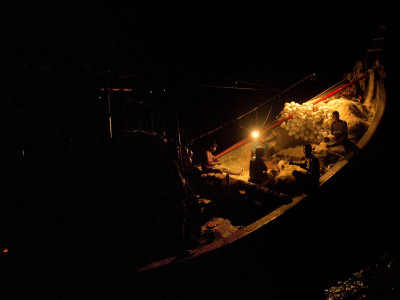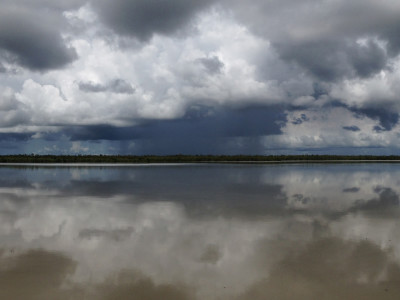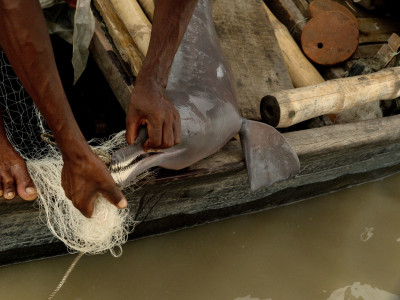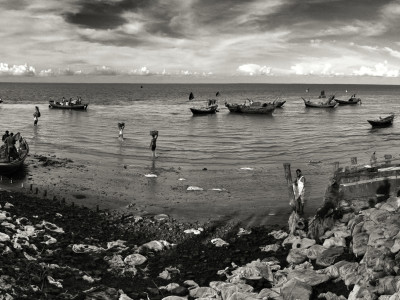There are pirates in the Sundarbans. I’d heard that they marauded in strength, thirty to a boat, three speedboats deep; a pile of 120 Chinese-made 0.22s among the 90 of them. They hid in the khals by day and sped around by night, looking for vulnerable fishermen.
They took kids, men, trawlers, all to be returned for a ransom: 20,000 Taka to a lakh for a human; 5,000-10,000 Taka for a trawler. This is how it worked: at an appointed time and place you showed up with the money and the exchange was made. In a show of honor among pirates, you get a ‘Get Out Of Jail Free’ card – a pass that meant pirates won’t bother you again.
],[https://www.peepli.org/wp-content/uploads/2015/02/IMG_0525-1000x1000.jpg,(medium)],[https://www.peepli.org/wp-content/uploads/2015/02/IMG_0525-1600x1600.jpg,(large)])
We pulled towards the riverbank. In a cove of golpata (nipa palm), half hidden from view, were two little thatched dinghies. Two fishermen were huddled in one of them. The rain fell in white veils around us as we pulled up alongside.
“The pirates came last night. They began to beat up my brother. We begged them to let him go. They did, but they took our trawler. Now we have five days to come up with 5,000 Taka.”
],[https://www.peepli.org/wp-content/uploads/2015/02/010_ARATIKUMARRAO_MOVINGWALLS-1000x667.jpg,(medium)],[https://www.peepli.org/wp-content/uploads/2015/02/010_ARATIKUMARRAO_MOVINGWALLS-1600x1066.jpg,(large)])
We met a boy a few days later, the son of a hilsa fisherman. He had been kidnapped and held for nine days. Did he have a chance to escape?
“I was on a boat, where would I escape to? No, it is best to wait out these kidnappings.”
They fed him once in two days, he said. On the appointed day, he was returned to his parents for 20,000 Taka in ransom.
Rumor has it that powerful people in Dhaka fuel these gangs; that bloody fights break out between rival gangs; that the coast guard and police are in on the racket; that some highly ranked policemen even run these rackets to make up the money they had to fork out as a bribe to get posted in a city of their choice.
Rumor has it that some pirates come from India; that one gang leader, the most feared of them all, is a woman, an Indian called Ganga; that they hold their prisoners on chars (sandbar islands); that they don’t attack tourists because that turns the heat up. Fishermen are easy targets.
Reality is that kidnaps happen; that fishermen pay big ransoms for their boats, their nets, their loved ones; that this drives them deeper into debt.
],[https://www.peepli.org/wp-content/uploads/2015/02/IMG_0247-1000x1000.jpg,(medium)],[https://www.peepli.org/wp-content/uploads/2015/02/IMG_0247-1600x1600.jpg,(large)])
Kids, who often accompany their dads on the little dinghies that ply these waters, are easy pickings for pirates.
“Want your kid back? Come to this same place in one week with 50,000 takas!”
The ransom demand per kid ranges from 20k to a lakh takas — humongous amounts for fishermen who are already deep in dept and facing a lean season on rivers empty of fish.
We passed many hilsa fishermen. We called out to them all.
Same question, same answer:
“No fish, nothing! This is a bad year!”
Pirates are not the only threats these fishermen face. Tigers, crocodiles, and venomous eel-tail catfish — they all get gnaw, swipe, get a piece of the fishers. But their most formidable opponent is not any of the above.
It is emptying rivers. Year on year the catch — especially that of the lucrative and prized hilsa (ilish maachh, in Bengali) — has been declining.
We watched hilsa fishermen pull up a net that had been sitting across the width of the Sela river in the Sundarbans for six hours.
They pulled and pulled. And in their net they found one ilish maachch, weighing about 1 kg or so. In the whole of this month they had netted just about 10 kgs in total. It was not a good season for these guys either.
Whether pirates, or crocodiles, or empty nets, one thing was certain. Fishing in the delta was becoming increasingly difficult. Every fisherman we met was sure of one thing: their debts were only set to mount.
],[https://www.peepli.org/wp-content/uploads/2015/02/onehilsa_2-1000x750.jpg,(medium)],[https://www.peepli.org/wp-content/uploads/2015/02/onehilsa_2.jpg,(large)])







